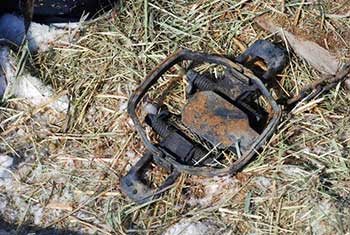 Marie Curie said, “nothing in life is to be feared, it is only to be understood.” And yet men driven by fear want to convince you that New Mexico’s wildlife should be feared and that science tells us so. In response to a proposed bill to ban traps on New Mexico public lands, trappers are desperately pleading that we not listen to the bill’s proponents because they’re “bunny-huggers” who don’t know what they’re talking about, and that we all should listen to scientists.
Marie Curie said, “nothing in life is to be feared, it is only to be understood.” And yet men driven by fear want to convince you that New Mexico’s wildlife should be feared and that science tells us so. In response to a proposed bill to ban traps on New Mexico public lands, trappers are desperately pleading that we not listen to the bill’s proponents because they’re “bunny-huggers” who don’t know what they’re talking about, and that we all should listen to scientists.
I am a wildlife biologist with a Ph.D. from the wildlife and fisheries department of a land grant university. I learned how to set leghold traps to collar wolves from an expert trapper. I’ve tracked and studied monkeys, lemurs, jaguars, herons, hyenas, wolves, and swift foxes across four continents for the past 15 years. I also happen to hug bunnies every chance I get.
As a wildlife scientist, I state confidently: Science doesn’t support trapping any more than it supports my bunny-hugging. Some undisputed facts about trapping: Trapping targets individual animals indiscriminately. Leghold traps and neck snares kill slowly (as do often ill-functioning Conibear traps). If your weight exceeds a certain limit and you step on a trap, your foot will trigger steel jaws that ensure you remain in or near that place until you starve, freeze, chew off your limb, or a trapper extinguishes your life with a shovel or strangles you after hours or days of pain.
Trapping, at the level it occurs in New Mexico, may not impact populations of raccoons and coyotes (although no one is tracking those populations, so this is an assumption). It does, however, threaten the perilous recovery of endangered Mexican gray wolves, with 43 wolves trapped and either injured or killed in traps in the past 18 years. We know trapping causes suffering and harm to individual animals to an extent outlawed in almost every other circumstance. We also know wildlife populations need no management by humans to maintain a certain threshold or carrying capacity. Wildlife populations are just fine left to their own evolutionary devices of self-regulation and predator-prey cycles.
Science is not prescriptive. Science tells us wildlife populations can support certain levels of mortality and still be around in 10, 50 or 100 years. Science doesn’t tell us if we should add our own selfishly motivated sources of mortality to natural sources. Questions of “should” are best left to ethicists.
Trappers would have you believe the world will run amok with wild beasts if they’re not working to keep everything in “balance.” That’s not science, though — that’s superstition and fear-mongering. So yes, Marie Curie, there is a boogie man and his name ain’t Santa Claus.
If we took Curie’s advice and spent more time trying to understand animal lives, we’d see them for what they are: complex, beautifully intricate and intrinsically valuable. At the very least, we wouldn’t fear them and would understand that no life should end with cruel entrapment, a confusing and terrifying imprisonment that only ends with blunt force or a choking lack of oxygen. We would understand that if we don’t believe a family dog should suffer that fate, a coyote shouldn’t either.
Lastly, in case you haven’t noticed, animals aren’t the only entities trappers ensnare. State agencies are captured by their business-as-usual model of kowtowing to anyone who wants to pay a pittance to the agency to kill animals. Don’t look to them for neutral science-based decision-making. Look to this legislative session for evidence-based common sense and decency to prevail with a ban on traps on public lands. We don’t need science to tell us trapping is wrong. We know traps that catch and maim our beloved dogs are wrong. We know that neck snares and body-crushing traps that kill wild and domestic animals in sadistic ways are wrong.
Please support Roxy’s Law to ban public lands trapping. Go to trapfreenm.org to learn how.
Michelle Lute is the National Carnivore Conservation Manager of Project Coyote, resides and travels extensively in New Mexico, and works across the US to promote science-based wildlife conservation.
